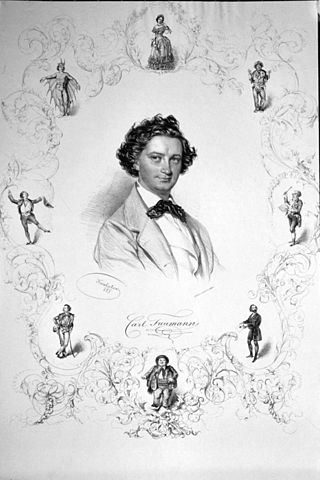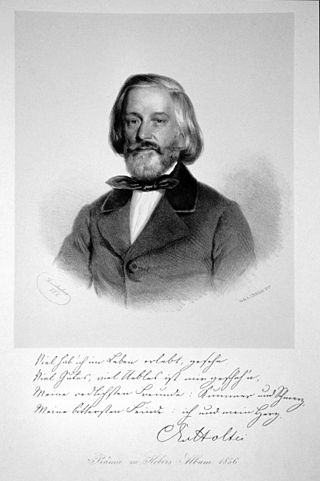Related Research Articles

Johann Nepomuk Eduard Ambrosius Nestroy was a singer, actor and playwright in the popular Austrian tradition of the Biedermeier period and its immediate aftermath. He participated in the 1848 revolutions and his work reflects the new liberal spirit then spreading throughout Europe.
Einen Jux will er sich machen (1842), is a three-act musical play, designated as a Posse mit Gesang, by Austrian playwright Johann Nestroy. It was adapted from John Oxenford's A Day Well Spent (1835), and first performed at the Theater an der Wien in Vienna on 10 March 1842. The music was by Adolf Müller.

The Carltheater was a theatre in Vienna. It was in the suburbs in Leopoldstadt at Praterstraße 31.

The Theater in der Leopoldstadt was an opera house in the Leopoldstadt district of Vienna, founded in 1781 by Karl von Marinelli, following the Schauspielfreiheit by Joseph II in 1776. The 19th-century summer stage called the Thaliatheater was also managed by the Leopoldstadt.
Wenzel Robert von Gallenberg was an Austrian composer, particularly of ballets, which were produced in Vienna and Italy.

Matthias Karl Ludwig Treumann was an Austrian actor, operetta singer (tenor), theatre director and writer.

Wenzel Johann Scholz was an Austrian actor in Laibach, Klagenfurt, Graz and in Vienna above all at the Alt-Wiener Volkstheater, who became known especially as brilliant partner of Johann Nestroy in his posses and Lustspiels.
Karl Meisl, or Carl Meisl was an accountant in the Imperial Austrian Navy, and a dramatist.
Thekla Kneisel, néeThekla Demmer was an Austrian actress and operatic mezzosoprano as well as a soubrette. She came from the actors family Krüger-Demmer and died at the age of 30 after a successful stage career in Vienna lasting only 15 years.

Karl Haffner (pseudonym), real name Karl Schlechter, was a German dramaturge.
Michael Hebenstreit was an Austrian Kapellmeister and composer for stage music.
Josef Kilian Schickh was an Austrian playwright who wrote mainly fairy tales, lokalposse and parodies for the Alt-Wiener Volkstheater, one of the three Wiener Vorstadttheater. He was the nephew of the journalist Johann Schickh and a contemporary of Johann Nestroy, Karl Meisl, Josef Alois Gleich and Franz Xaver Told.
Wilhelm Turteltaub was an Austrian physician and writer.
Friedrich Ernst Hopp was an Austrian actor and writer.

Wilhelm Wiesberg, real name Wilhelm Bergamenter, was an Austrian writer and folksinger.
Julius Hopp was an Austrian composer, conductor, arranger and translator.

Adolf Müller Sr. was a composer from the Austrian Empire and late Austria-Hungary. After an early career as an actor and singer, he composed operettas for theatres in Vienna.

"Kommt ein Vogel geflogen" is a German-language Volkslied and love song from Lower Austria. While it was passed down orally, probably in dialect, some text first appeared in print in 1807. Six stanzas appeared in a Posse mit Gesang by Karl von Holtei in Berlin in 1824 and made the song popular. In arrangements, it also became a children's song. Siegfried Ochs treated the melody humorously to variations for piano, imitating different styles of classical composers.
Franz Volkert was an Austrian organist and composer. He composed church music, and a great amount of music for dramatic works at the Theater in der Leopoldstadt in Vienna.
References
- Warrack, John and West, Ewan (1992), The Oxford Dictionary of Opera, 782 pages, ISBN 0-19-869164-5